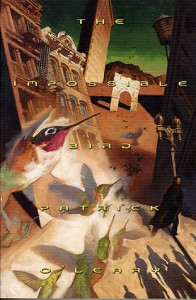
I bought The Impossible Bird based on my past experience with Patrick O’Leary, including his wonderful debut novel, Door Number Three, and The Gift. O’Leary seemed to be some kind of cross between the wild ideas of Philip K. Dick with the literary sensibilities of Gene Wolfe, and in those two books the combination worked very well. And that’s why the first 70 pages or so of the The Impossible Bird were such a surprise, and unfortunately, not a pleasant one, for it seemed to be all random violence in endless plot sequence without any textual beauty. I put the book down for weeks and only returned to it today because I had nominated for our monthly book club and the meeting was tonight.
Having now finished it, I still don’t think it rises to the level of his previous books but I’m not as disappointed with it as I thought I’d be. I found the theme, that life is not worth living if there’s no death to measure it by, to be interesting, if not necessarily something I would agree with, and there was some explanation for the rough violence of the beginning. But mainly I’m left with a sense that the novel suffers from the all too easy comparison to the movie, The Matrix, and while these themes and ideas were around long before that movie, it now looms large in the public consciousness.
The basic story, and I’m trying not to give anything away here, is of two very close brothers with a mysterious connection that goes beyond their familial relation and what happens after their deaths. This life-after-death plot is a lot like Jonathan Carroll’s similarly flawed novel, White Apples, in that by removing the reader from the “known” world of reality, a loss of structure becomes very hard for the reader to grasp. It’s as if there were no rules left for the writer to have to follow, nor for the reader to assume, and the result is a hazy world of dreams that quickly breaks down into a series of talking heads. O’Leary tries to spice this up with some “bullet-time” action (even going so far in one scene as to actually slow down the bullet so that a character can reach out and touch it), but without the framing world, it quickly becomes full of action and fury that ultimately means little to the overall story (in fact, the little logic of the world starts really breaking down when you start to question “why does it take these three things to escape the matrix, and why not others…”).
The ending (and spoilers may be here) tries to resolve this, by working around to a reconciliation of the charaters to the main theme, but the gung-ho plot antics made me care much less for the characters when we got to that end. Like them, I was pretty much just ready for it to be over, which may have been what they were looking for, but isn’t necessarily the emotion you wish to evoke from your readers.
[Finished 16 April 2005]
